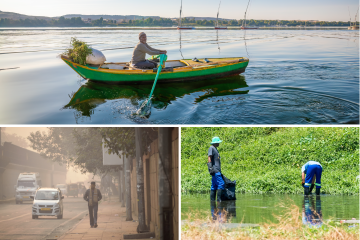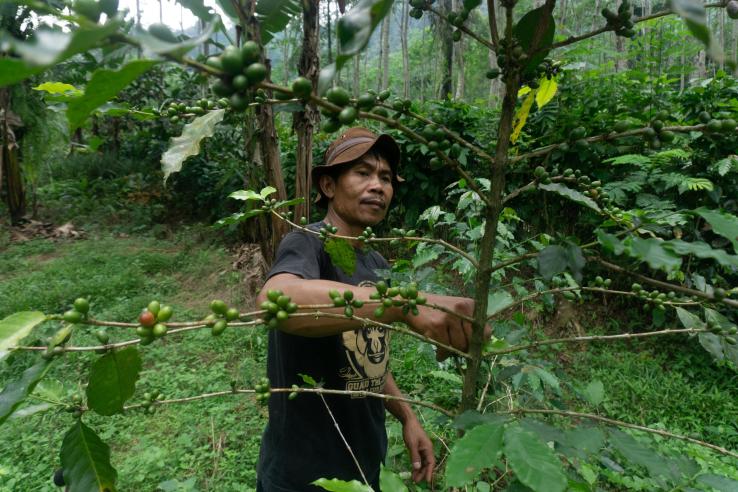
Growing evidence-informed climate policy: Five scaling stories from the King Climate Action Initiative

J-PAL’s King Climate Action Initiative (K-CAI) supports pilot studies, randomized evaluations, and scaling projects at the nexus of climate change and poverty alleviation. Three years ago, the initiative concluded its first funding competition. Since then, K-CAI has generated evidence that has informed real-world policy design and implementation, including the ongoing scaling of five evidence-informed climate policies that cut emissions and/or increase the resilience of communities severely affected by climate change.
Climate impacts are worsening worldwide, as evidenced by extreme heat and weather this summer, and people living low- and middle-income countries are disproportionately affected. Climate change threatens the lives and livelihoods of communities who have contributed least to the climate crisis, and has the potential to reverse decades of progress in global poverty alleviation.
K-CAI, in partnership with King Philanthropies, is dedicated to addressing this challenge by innovating, testing, and scaling high-impact solutions to combat climate change and poverty.
K-CAI’s growth over three years
K-CAI has supported and launched 13 scaling projects and 32 randomized evaluations across 35 countries—increasing researchers in the J-PAL network evaluating policies at the nexus of climate change and poverty alleviation by 195 percent.
In the three years since K-CAI’s first funding competition, K-CAI-funded researchers have collaborated with 26 government partners, 22 NGOs, and 22 private sector businesses, including the Gujarat Pollution Control Board, the City of Cape Town, BRAC, and Centre for Net Zero founded by Octopus Energy. Below are five examples of how evidence generated through K-CAI is informing policies or being applied directly at scale by decision-makers.
Stories of informing climate policy with evidence
K-CAI-funded research is beginning to yield actionable insights that are increasingly being used by policymakers to mitigate and adapt to climate change.
Reducing air pollution and greenhouse gas emissions
The Government of Gujarat is working with a K-CAI-funded research team, J-PAL South Asia, and EPIC India to scale an emissions trading scheme (ETS) for particulate matter to address severe air pollution in India. The ETS has been scaled in Surat, a city with 6 million people living in its airshed, and in Ahmedabad, home to 9.3 million people in its airshed. The research team, including J-PAL affiliated professors Michael Greenstone, Rohini Pande, Nick Ryan, and Anant Sudarshan, found that the emissions market reduced plant pollution by 20–30 percent on average, as well as industries’ average costs associated with pollution abatement. Several other states are also exploring plans to launch emissions markets informed by this work.
In the United States, the Colorado Department of Public Health is using a machine learning model, developed and field-tested by a K-CAI-funded research team, co-led by J-PAL affiliated professor Michael Greenstone, to target methane inspections more effectively. As part of their long-term partnership, they are now investigating if inspections triggered by real-time emissions data can further improve compliance and reduce emissions from oil and gas facilities.
In Bangladesh, a K-CAI-funded research team is working with government partners to reduce emissions from brick manufacturing. They are building on promising preliminary results from a K-CAI-funded randomized evaluation to scale a training on proper operation of zigzag kilns, which were found to significantly reduce carbon and particulate matter emissions and increase the value of inventory when used correctly. As brick manufacturing in South Asia is dominated by inefficient coal-burning kilns, the training could significantly reduce emissions in the industry. In collaboration with the government, brick manufacturers, and local research institutions, the K-CAI-funded team, including J-PAL affiliated professor Grant Miller, J-PAL invited researcher Stephen Luby, and Nina Brooks, is working to scale the training program to zigzag kilns across the Dhaka region through 2025.
Adapting to climate impacts: Extreme weather and erratic rainfall
A K-CAI-funded research team is studying a flood early warning system (EWS), aiding Google's Flood Forecasting Initiative in South Asia. This team, featuring J-PAL affiliated professor Rohini Pande and J-PAL invited researcher Maulik Jagnani, is working with Google and the local NGO Yuganter to perform the first randomized evaluation of a flood EWS. This system combines smartphone alerts and grassroots volunteers to alert people about upcoming floods. The initiative directly affects 160 communities (1.8 million people) in rural Bihar. Additionally, it informs the design and messaging of smartphone alerts as well as the integration of human intermediaries in similar systems used by groups like the Federation of Red Cross and Red Crescent Societies and the Indian Red Cross Society.
In Niger, a K-CAI-funded research team is working with local partners to scale a program training farmers to adopt rainwater harvesting techniques in a more accessible way, which aims to initially reach around 6,000 farmers. Earlier findings showed that the training increased adoption by 90 percentage points and increased agricultural output by around 12 percent. Simultaneously, the research team, including J-PAL affiliated professors Jenny Aker and Kelsey Jack with Maigari Malam Assane, is now testing ways to make the training cheaper and easier to implement to finalize a cost-effective and scalable program model.
Insights for future forest protection programs
Rigorous evaluations have shown that, when designed and implemented well, payment for ecosystem services (PES) programs can be a potentially promising and cost-effective climate mitigation solution. In Mexico, the National Forest Commission and K-CAI-funded researchers, including J-PAL affiliated professor Seema Jayachandran, J-PAL invited researcher Santiago Saavedra, and Santiago Izquierdo-Tort, found promising impacts on reducing deforestation from an innovative PES program that modified certain design features, such as using stricter contracts, to increase PES programs' effectiveness in reducing deforestation and thereby delaying carbon emissions.
Based on these results, there is high interest in PES programs from governments across Latin America who are working to combat tropical deforestation in vital biomes. Together with government partners, K-CAI is currently exploring how to potentially apply these policy lessons to inform the policy design of key existing deforestation programs using cash transfers.
Looking forward: Partnerships for effective and equitable climate policies
These case studies illustrate just a few examples of how rigorous evidence can inform policy and benefit the lives of people most impacted by climate change. But as climate impacts worsen, more evidence-informed policies are needed. K-CAI is continuing to fund new climate research and scaling projects to reach people experiencing poverty and will share more stories of evidence informing climate policy in 2024.
“These stories show that evidence of impact can be a powerful tool for decision-makers in scaling effective climate solutions. I want to commend the policymakers and implementers collaborating with J-PAL affiliated researchers for showing the world that it’s possible to learn at the same time as we take action to combat climate and poverty.” — Claire Walsh, Associate Director of Policy, K-CAI Project Director, J-PAL Global
K-CAI is actively seeking new partnerships with governments, NGOs, the private sector, and funders to innovate, evaluate, and scale high-impact climate solutions. If you are interested in partnering with us to support evidence generation and scaling high-impact policies at the nexus of climate change and poverty alleviation, or to learn more about existing evidence and how it can inform policy, please contact us at [email protected].
This piece was originally published on December 21, 2023 and has since been updated.

